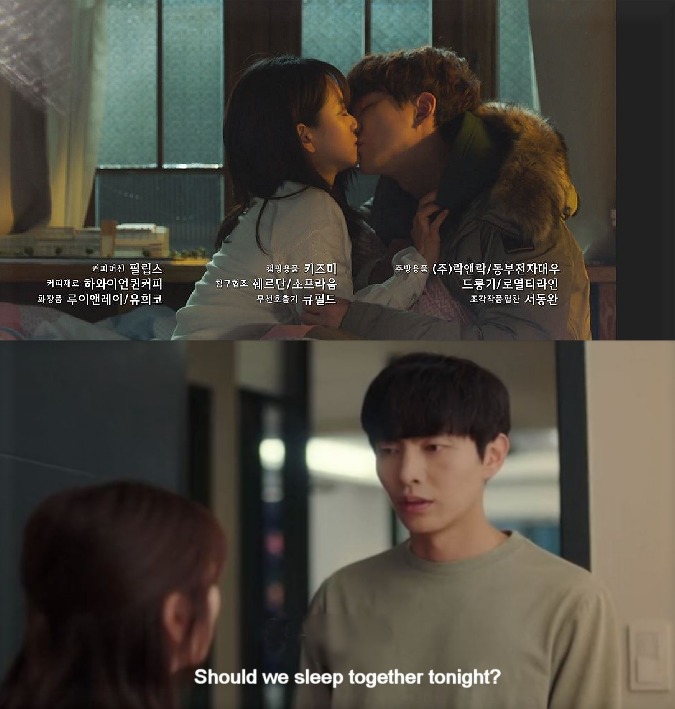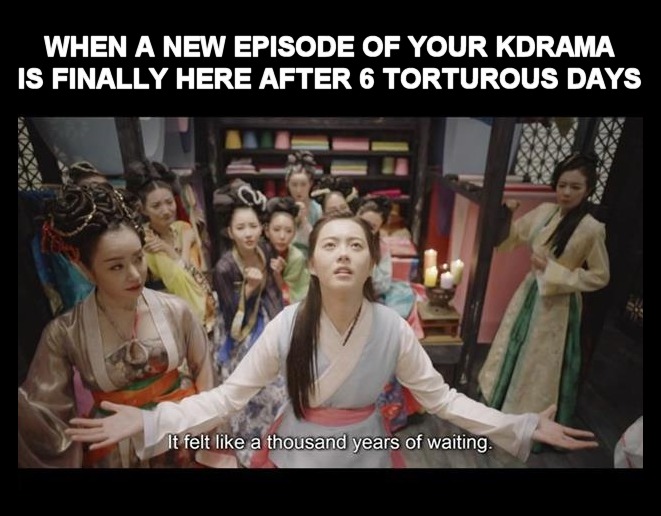MASTER COMPREHENSIVE LIST OF
180 KOREAN DRAMA CLICHES OR TROPES
Created by the
Message Board Members of Kdramalove
(Please Do Not Reproduce For Another Website But Link
Here)
1.
Piggy Back Rides.
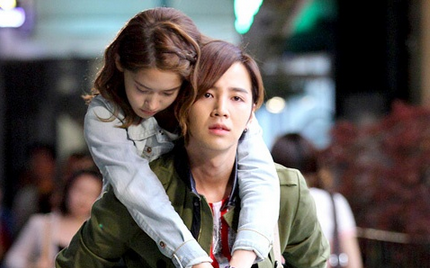
2. Love
Triangles or Quartets.
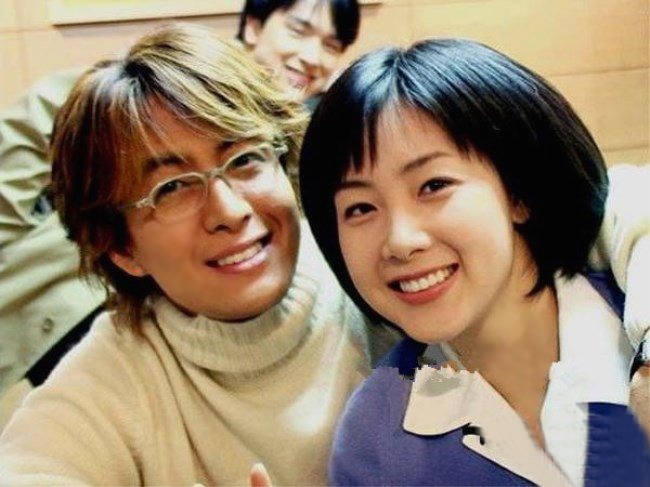
3. Rich boy, Poor girl plots.
4. The Evil or Interfering Future or Present Day
Mother-in-Law.
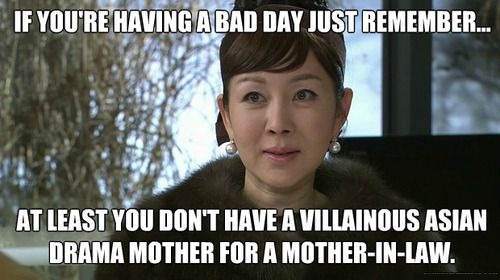
5. Back Hugs.
6. Fix The Boo Boo Scenes.
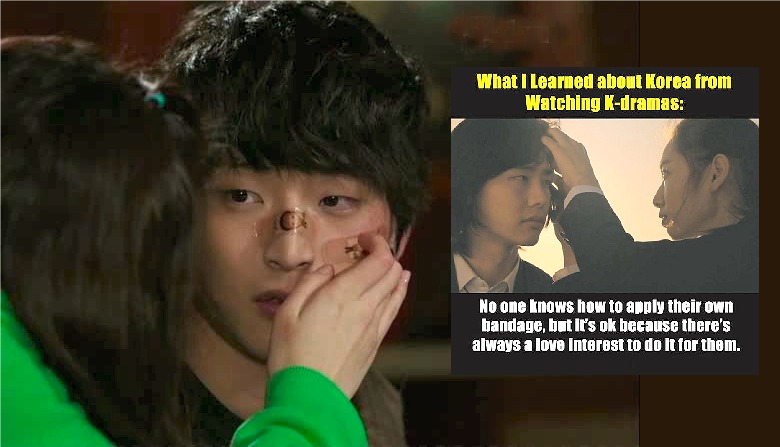
7. Staring at the loved one while
they are sleeping.
8. In sad scenes it often rains to make the
character(s) look more pitiful, and they often lack an
umbrella.
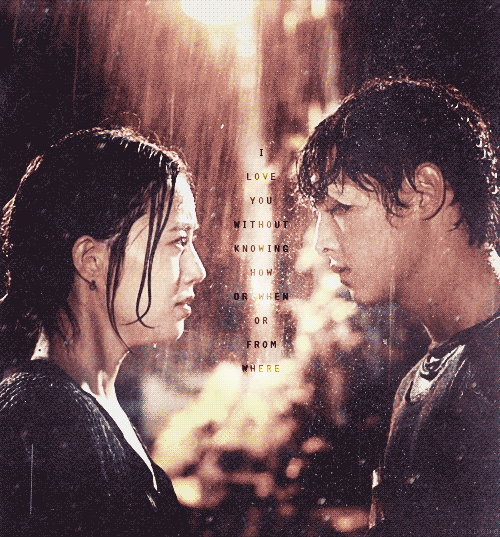
9. A girl will walk into oncoming
traffic and a hero will pull her toward him to save her
life.
10. A girl will have an accident, like
falling into a ditch, and the hero will rescue her.
11. Car or
motorcycle accidents are in practically every drama
(except for historical ones, of course).
12. The proverbial
white truck almost hits a person but someone rescues
them. The truck is ALWAYS white.
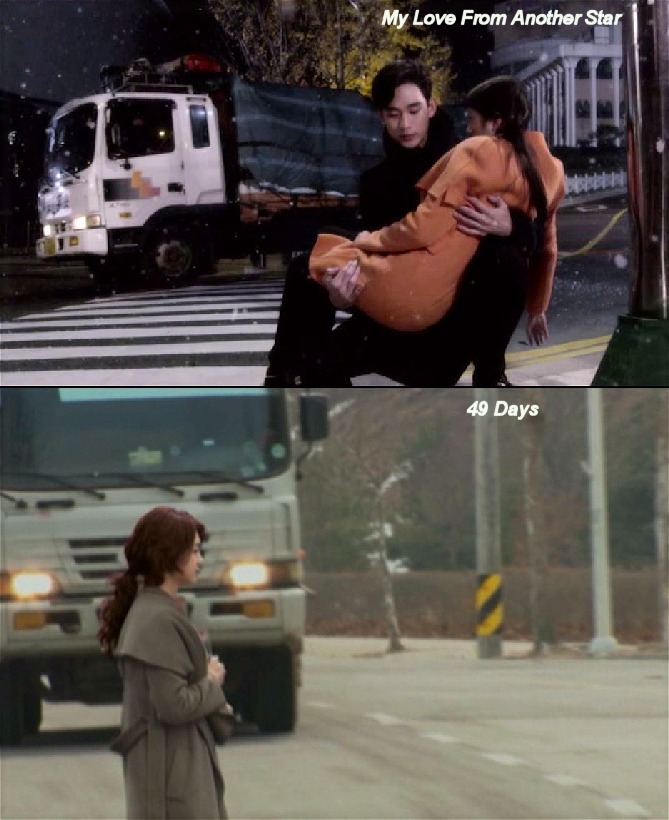
13. Characters
sitting at the back of a bus.
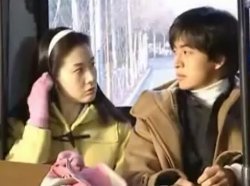
14. 2 Characters on a bus together,
it stops short, and the heroine falls onto
the hero's body.
15. Making kimchi scene, often a couple or
family / friends combined effort.
16. Rich people
sleep on beds, poor people on the floor on mats or
blankets.
17. The forced wrist grab.
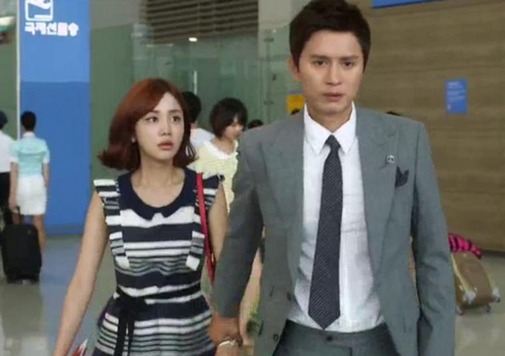
18. Getting
drunk on soju scene.
19. Girl
getting drunk on soju and then vomiting on the male lead.
20. Everyone
eats ramen for a quick meal, rich and poor alike, and
often combine it with kimchi.
21. If a girl
is a tomboy she gets a bowl cut.
22. If a girl is
pretending to be a boy she gets a bowl cut.
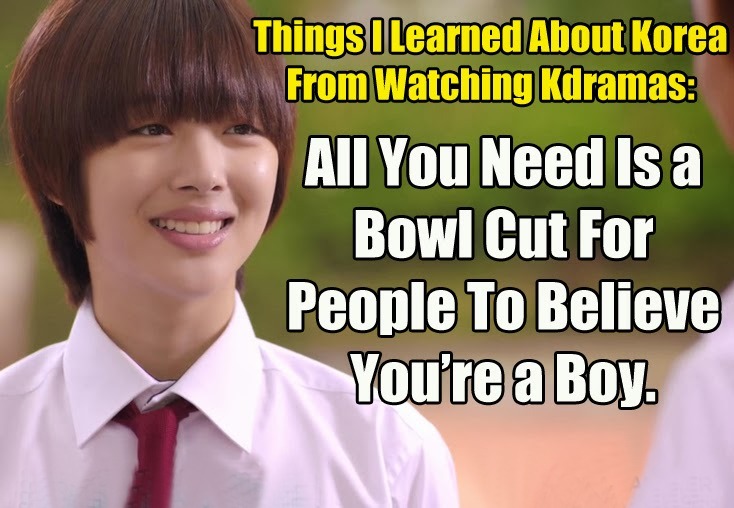
23. Confession of someone's romantic
feeling and desire to kiss, only to find out the other
person has fallen asleep or is passed out from excessive
drinking.
24. Still about to kiss, someone will appear
to interrupt or a cell phone will go off.
25. Open eyed kissing
scene (poor Park Shin Hye often gets blamed for this but
it's certainly not limited to just her dramas!)

26. American characters are played
by Australians because their actors live closer to Korea
and cost less to employ.
27. The lead couple whom you know will end up
together at the end do not get along at first.
28. Bromances.
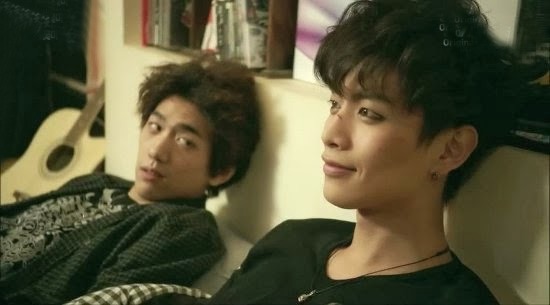
29. Second Male Leaditis: Dramas
written so that the 2nd male lead is nicer than the 1st
male lead, which causes
the audience to develop fondness and loyalty for the 2nd
male lead first, and sometimes permanently.
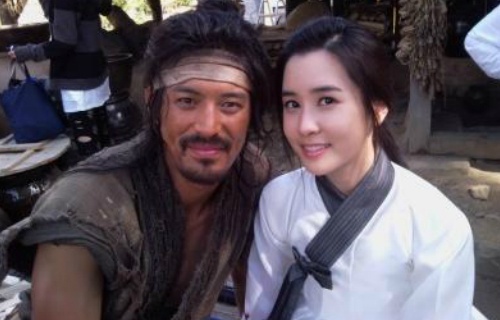
30. Elevator escape scene. Door
closes in nick of time before the chaser could stop it.
31. Umbrella sharing scene when it rains.
.
32. Learning how to ride a bicycle scene
or couple shares one bicycle while riding
together.
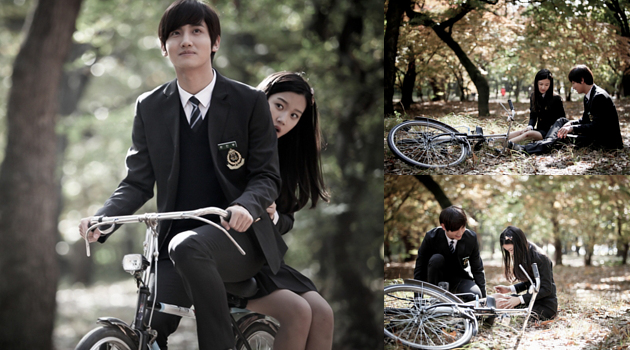
33. Male lead preparing a meal for
female lead (who sometimes doesn't know how to cook), or
vice versa.
34. Male lead confessing his love by
serenading in song (i.e. Bing Goo).
35. A couple
fall in love only to discover they might be siblings or
half-siblings (older plot device not used as much
anymore).
36. Amnesia Plots. Lots and lots of amnesia plots!
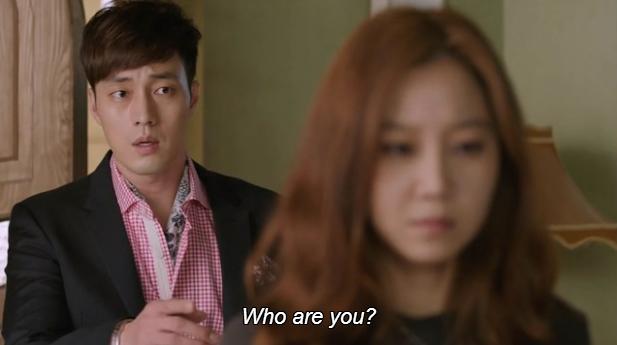
37. Someone wakes from a coma and
can see ghosts or possesses another supernatural power.
38. A chaebol (mogul) who has only loved and
trusted money his whole life falls in love with a girl
out of his class, and in helping her to grow
stronger he reforms himself into a better person.
39. Opposites
attracting.
40. Couples
getting together for the first time making an issue of
their ages. The older one is supposed to be
treated with more respect and more formal language than
the younger one.
41. "Ahjussi!"
"Ahjumma!" "Aggasi!" "Oppa!" "Noona!" etc.
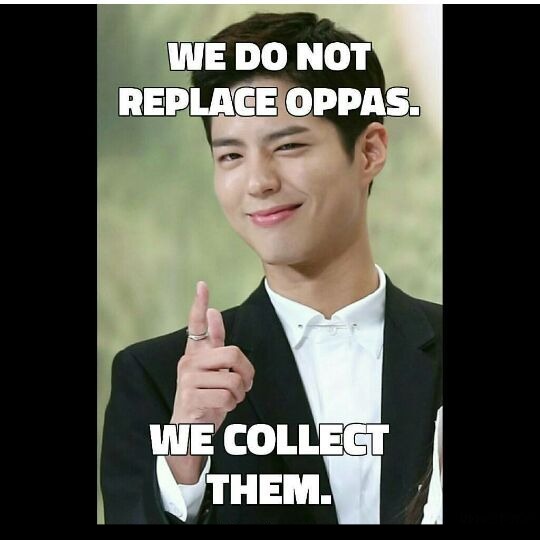
42. The prevalence of Loan Sharks.
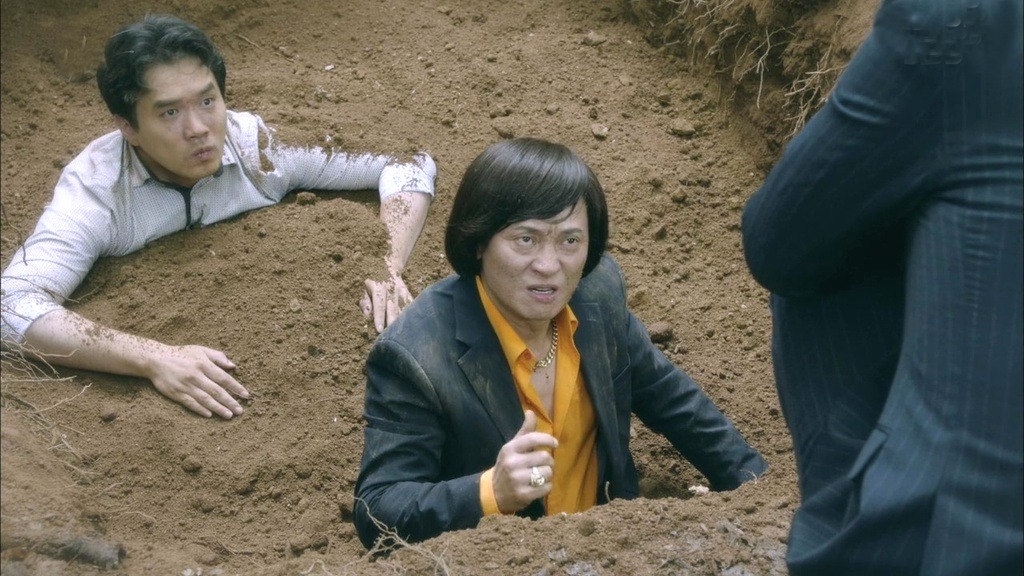
43. Shower scenes so the male lead
can show off his naked torso. Usually happens in episode
1 (as if we women won't watch a drama unless this
happens).
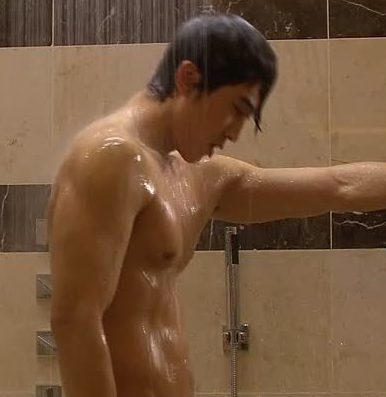
44. Skyscraper Rooftop Scenes and
Rooftop Apartment Scenes. It doesn't seem to matter if
you make a small salary, somehow you get the top
floor of an apartment building with the most expansive
view. It doesn't seem to occur to most K-drama writers
that it's not easy access to get to the top of a
skyscraper to conduct a conversation or
to have a violent scene take place. Only authorized personnel get keys to walk
around the rooftop of a skyscraper. The doors are kept
locked otherwise.
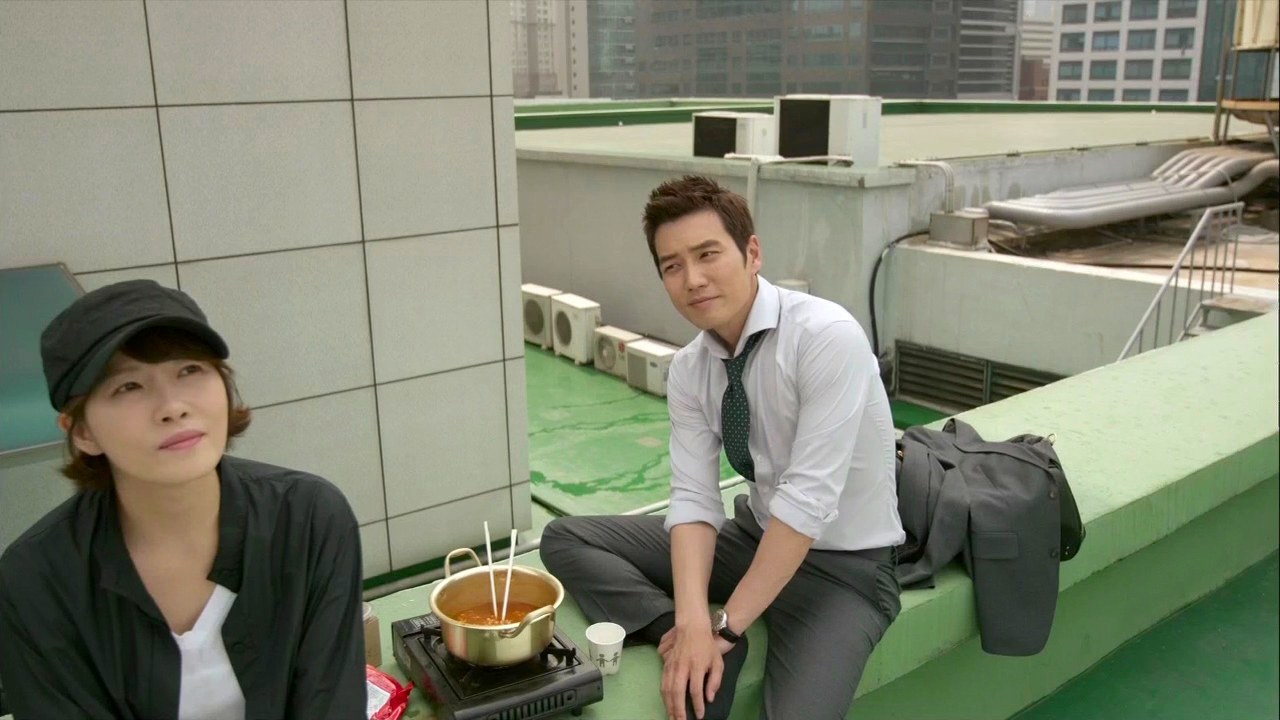
45. If you are rich, you tend to be
a jerk.
46. If you are poor, you are an angel.
47. You are
poor, an angel, and also you are not too smart so people
take advantage of you.
48. If you are
not smart, but try to do better in school, you don't
know you are studying really hard until you get a
nosebleed.
49. If you get
a nosebleed, guess what, it's probably cancer (usually
leukemia).
50. Stalking Scenes.
When a male lead character becomes fascinated with a
female lead character he will follow her around
secretly, sizing her up.
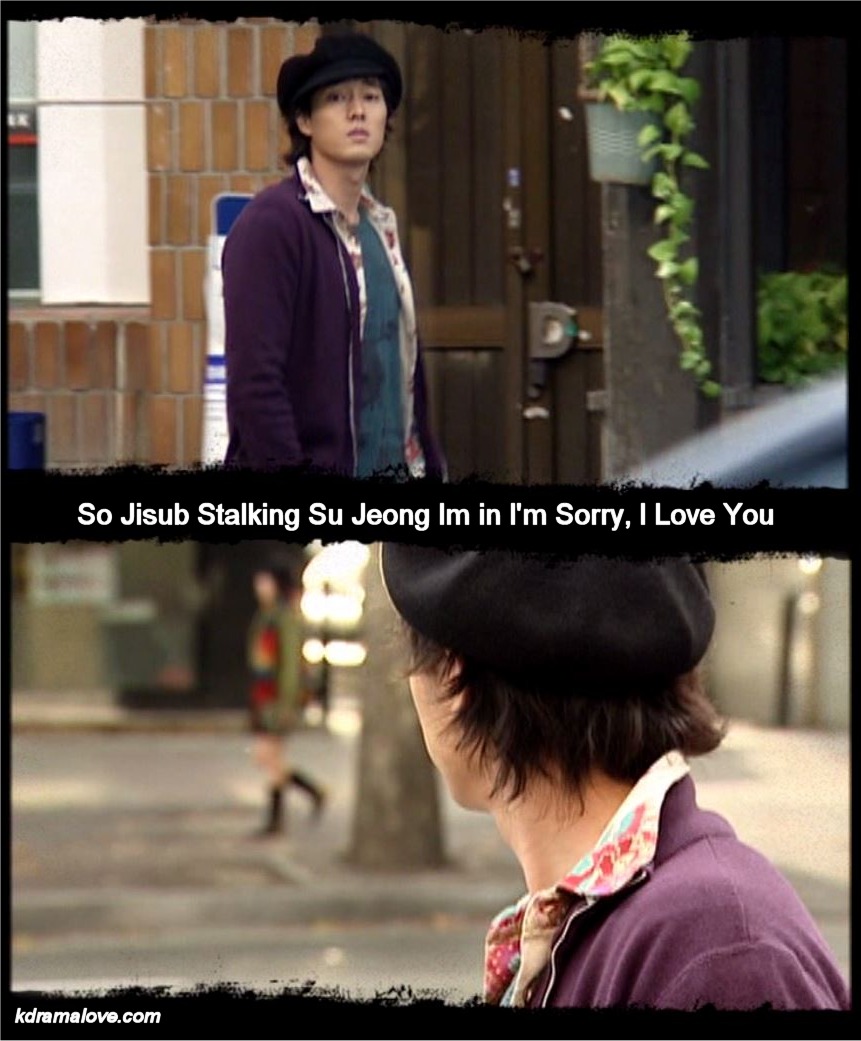
51. Fascination
with Snow, playing with snow, building snowmen.
52. Everyone
has a family picture hanging on their living room wall
and it's HUGE!
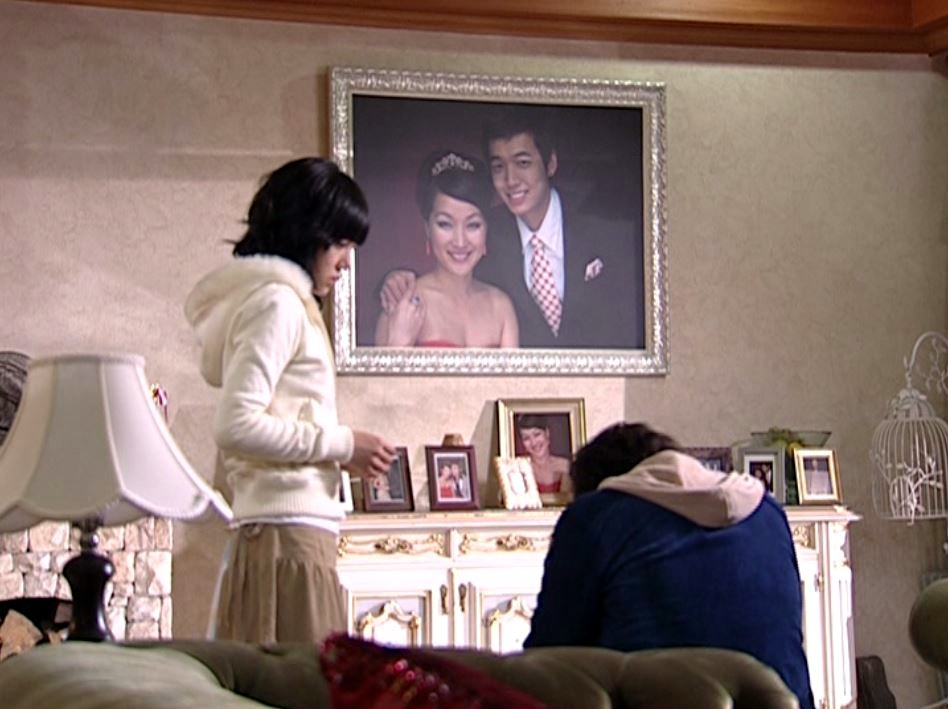
53. Funerals are always held in
hospitals, not funeral halls, with the dead person's
formal picture surrounded by mountains of flowers.
54. Suicide attempts, often by young people
being bullied, often while standing on top of a rooftop
of a school, or deliberately walking into traffic. Someone
almost always saves them in time, or convinces them to
come down of their own accord and start their life anew.
55. When couples go into coffee places to
sit together and drink and have a conversation an
argument usually results and one person will leave with
tears in their eyes, while
the other sits at the table all alone, looking sad.
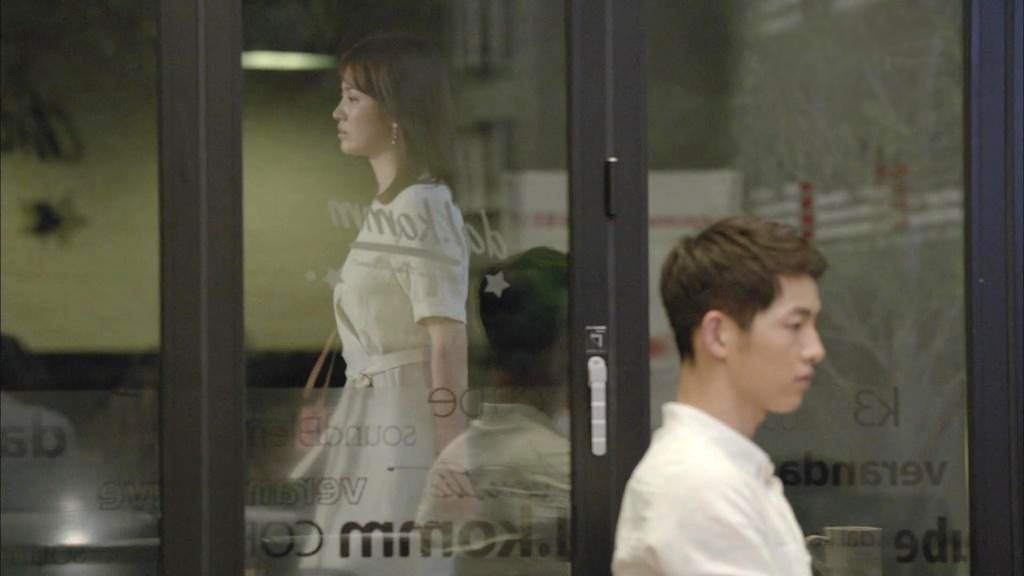
56. Every Korean home's kitchen must
have a rice cooker, and the thing is always left on and
the rice warm for whenever anyone is hungry. Apparently
no one has heard of instant rice in Korea or just making
a small batch in a regular pot.
57. Even if a character is poor they wear
designer clothes or carry the latest cell phone..
58. Crazy Driving:
even cops and emergency vehicles can drive like crazy
people, and anyone can make dramatic U-turns on the road
whenever they want, with never any police around to give
them a ticket.
59. There is a
hospital scene in practically every drama and often the
patients just get up and walk out any time they want,
without paying their bills or even getting their
diagnosis!
60. If someone is in a hospital room for an
extended stay there is always a humidifier placed nearby
putting mist into the room.
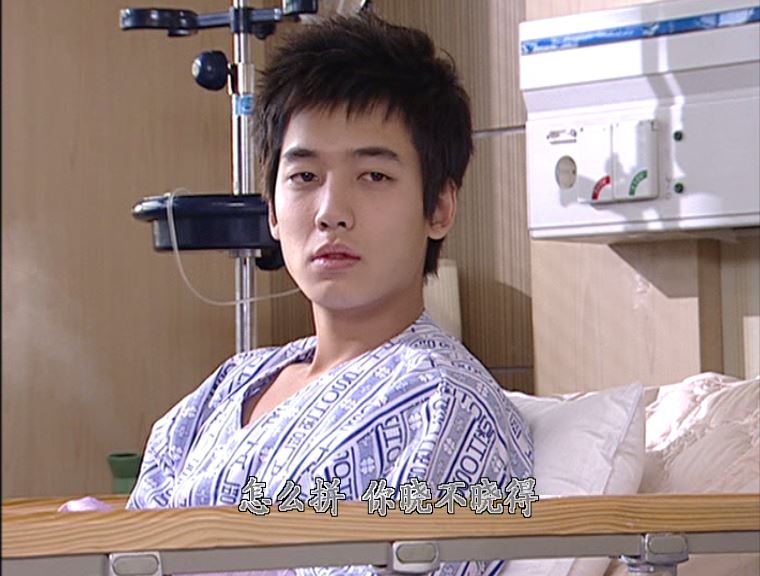
61. Children
grow fond of each other, are painfully separated in some
way, and then meet later as adults and don't recognize
each other.
62. Contract
marriages. The older generation tries to arrange
marriages for their children, and the two people barely
know each other, or even like each other.
63. The jealous
ex-girlfriend tries to break the lead couple up, or the
ex-boyfriend tries to make his old girlfriend feel
guilty about liking someone else.
64. Sometimes
the exes of the main couple, or the 2nd lead characters
who want to be with the main characters, conspire
together to break them up. That always backfires.
65. Beach scenes. Some couples fight on
them, some are reunited on a beach after years of not
seeing each other, some just stare blankly out to sea
and talk gibberish to each other, some just run around and kick sand and water
at each other and laugh, and sometimes someone actually
dies on one.
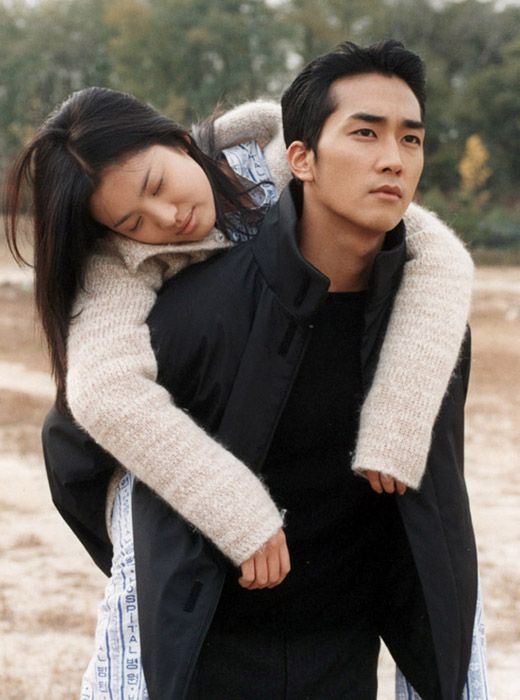
66. When
there are beach scenes there's never anybody else enjoying
the beach, the characters are alone with each other so
there are no distractions.
67. Whoever
goes to the US to study always comes back as
professional / more successful and polished person.
68. Someone goes to
Europe, comes back as a Chef or Barista or Fashion
Designer.
69. If you
stayed in Korea for education you are deprived, nothing
changes except maybe your hairstyle.
70. You have to go to
US / Europe for advanced medical treatment because
apparently Korean medical care stinks.
71. Only First Loves
Matter! No one can really be happy unless they
marry their first love.
72. The height of
fashion in Korean dramas is to wear T-shirts or sweat
tops or other clothing with words printed on them
(especially if it's a Gong Hyo Jin drama!).

73. "You must have saved the country
in your past life." Common saying when one character is
complimenting another character for their good deeds or
character.
74. Fathers are often violent. Sometimes they
will even hit their grown sons with golf clubs, to keep
them in line.
75. A couple
who are attracted to one another are in a car together
for the first time and one forgets to put on a seat belt
(usually the girl) and the guy leans over her, touching
her body with his and yanks on the seat belt and
fastens it. Immediately afterward they have a staring
contest moment when they look at each other with
interest, as if they are frozen in time.
76. Noona Romances
(Older Woman, Younger Man).
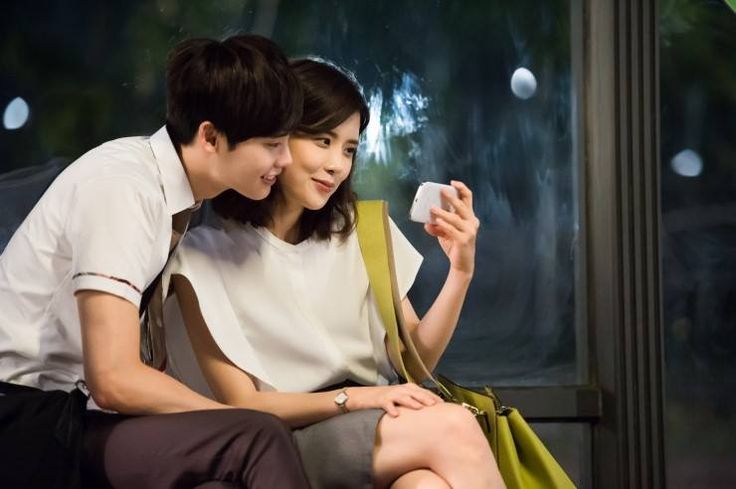
77. If there is a chase scene the
characters always end up in a marketplace and end up
knocking over carts of fruits or vegetables that
peddlers are selling.
78.
If someone dies everyone grieves vehemently ... and
then seem to forget all about the person come the next
episode.
79. Wild Nightclub Scenes - none of the
people in them are old, fat, average looking - rather
they all have perfect figures and hair and makeup, but
act like tramps and gigolos. It's scenes like those that make foreigners
ask, "Is everyone beautiful in Korea?" when there are
actually plenty of average looking people.

80. In the Wild Nightclub Scenes
there's people having drinking contests.
81.
Bad guys hang out in pool halls.
82. Time Travel or
Time Warp Dramas. If they are medical based the modern
doctors traveling into the past always end up saving
patients who would have died otherwise without their
modern medicine skills - even if they failed to grab
antibiotics or stitches or scalpels before they left the
modern world, but only a battery operated light.
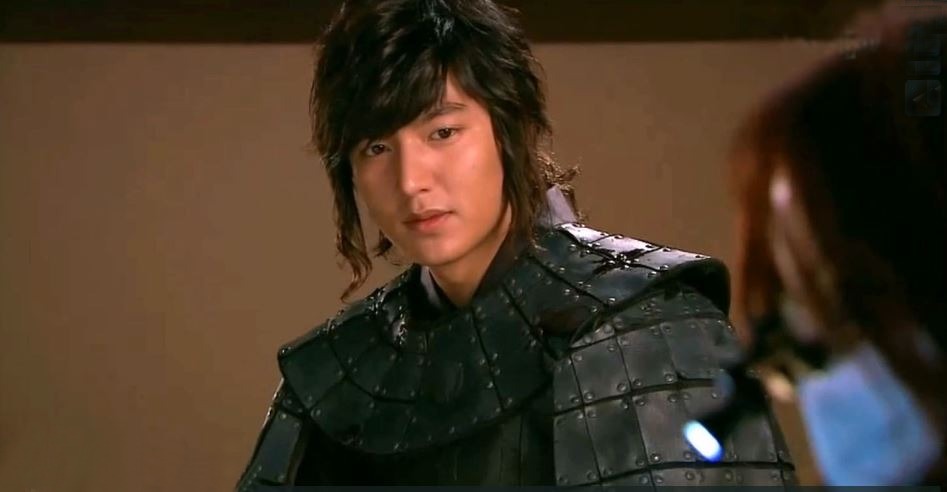
83. Modern friends/lovers from
countryside get separated because someone
moved to the main city and they totally lose
communication. Everyone forgot how to send text
messages, call from their phones or even send e-mails.
84.
Everyone always has a cell phone, but nobody thinks to
use it to call 119 (the opposite of America's 911) when
there's an accident ... and so often, if the male lead
is involved, he'll resort to running through the streets
piggybacking the invalid.
85. For
whatever reason, the heroine leaves home, packing up
only a small valise or suitcase. Nevertheless, in the
ensuing scenes one sees her wearing a seemingly infinite
number of fashionable coats or carrying a similarly
infinite number of designer handbags.
86. Characters who
are police always seem to go into a crime scene without
backup. They NEVER call for backup and then they get
badly hurt or someone else gets hurt because there
wasn't enough manpower there to stop a crime. They think
they can handle it all on their own.
87. There never seems
to be any labor protection laws in Korea. Someone can be
fired from a corporation at the drop of a hat, for any
reason.
88. There seems to be
no health insurance in Korea. Characters die or are
permanently injured because they can't pay their bills
and are turned away from the hospital doors because they
are poor!
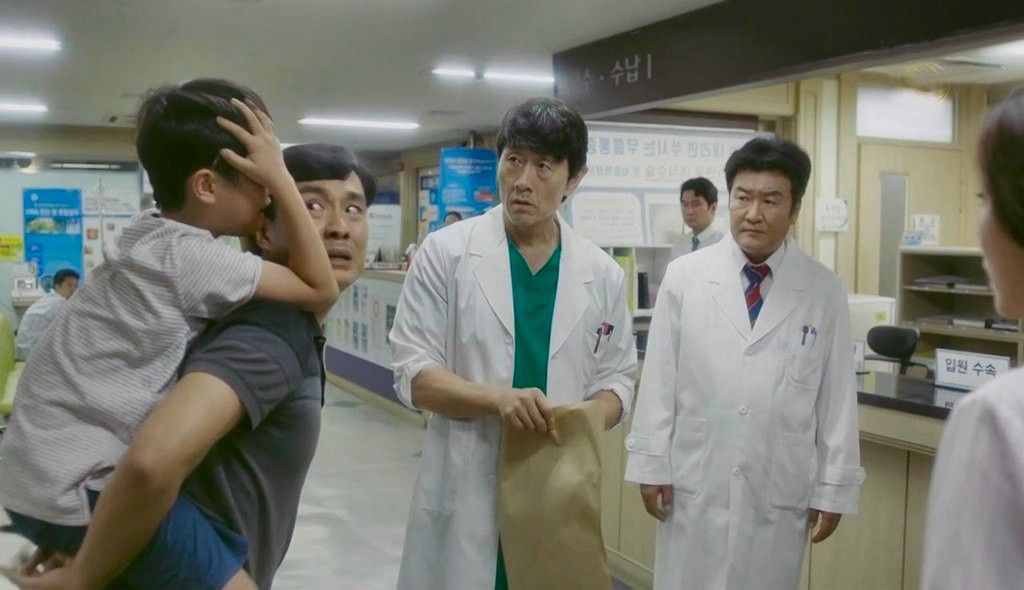
89. Product Placement Scenes (I
hate these! They should put all ads in the end credits
like they did in the old days).
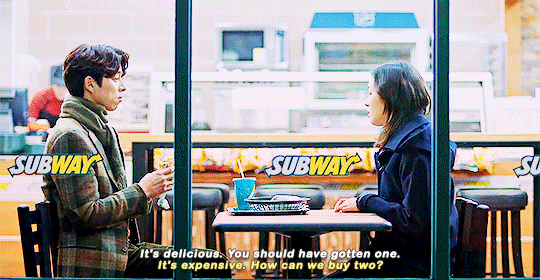
90.
The characters will talk to a big
stuffed animal.

91. Romantic
shows will feature their own necklaces (Winter Sonata,
Master's Sun, etc).
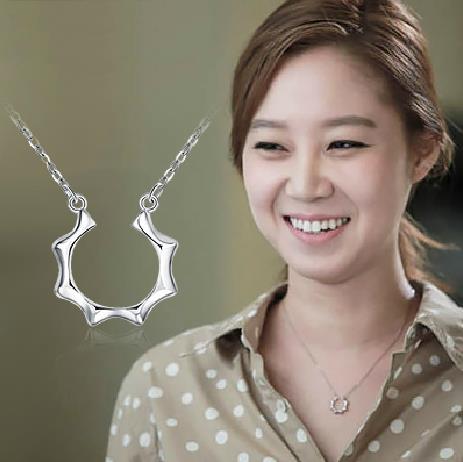
95. Bathroom scenes. Lots and lots
of bathroom scenes. Characters defecating appear to be
very funny to the Koreans. We also see scenes with
characters brushing their teeth or plunging their faces
into a sink full of water.
96. The camera will pull away from the
actor's face and focus entirely on their hand clenching
into a fist to show frustration. This is practically in
every K-drama now.
97. If the female
character lives in an apartment away from her family she
almost always has a roommate and that roommate is never
as pretty as she is. The friend can never overshadow the
main female character in physical attractiveness. She's
only support.
98. The lead
male character's best friend is the same. He's usually
on the homely side, fat or with a comic face. He can't
overshadow the lead male character in any way in
physical handsomeness. He's only support.
99. One of the leads
is always running after a car or bus that the other lead
has gotten into. Usually waving their arm in the air to
get their attention.
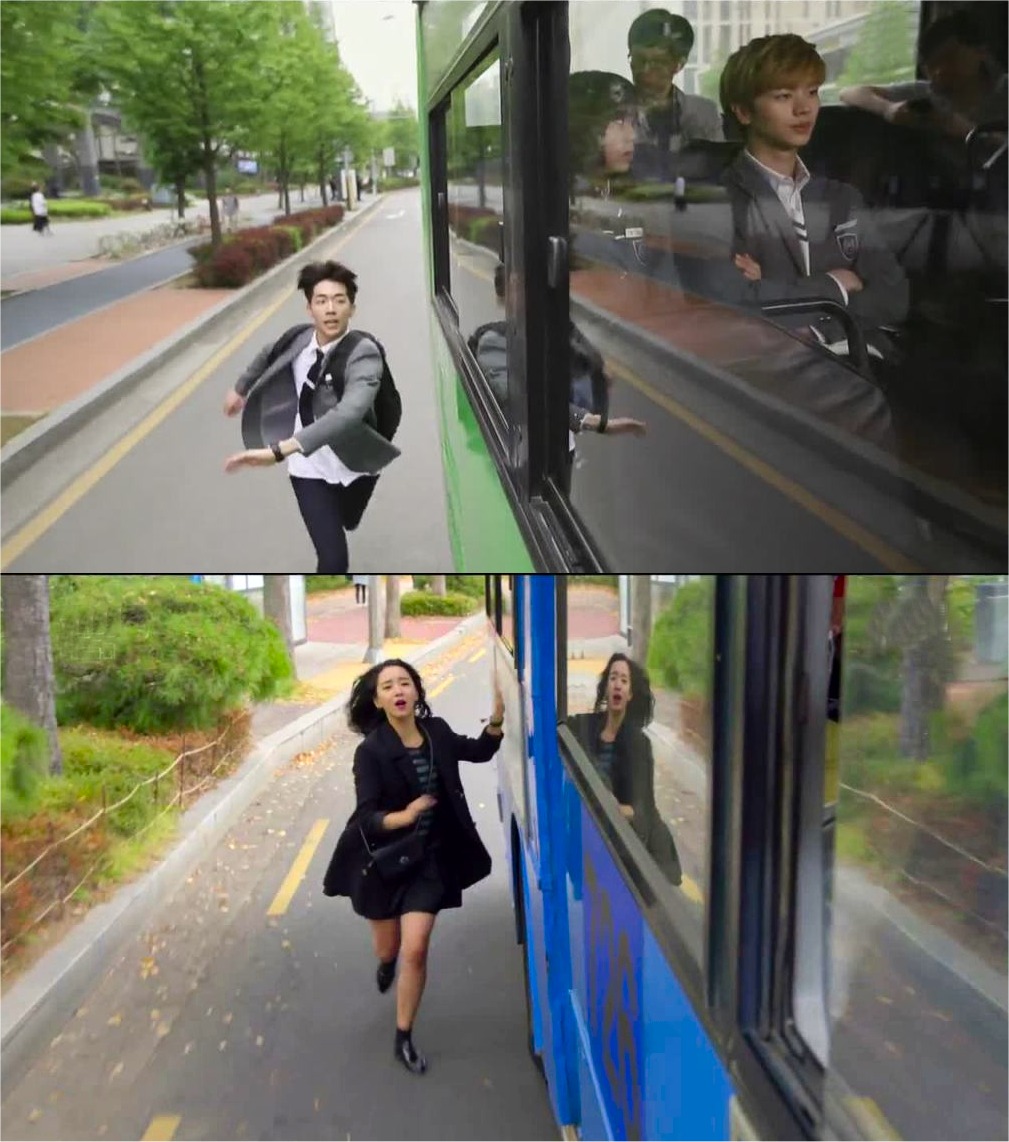
100. If couples or friends go to the
movies or the theater there is always at least one
person who will cause a disturbance or get up and leave,
causing annoyance to the rest of the audience (i.e
Personal Taste, Goblin, Descendants of the Sun, etc).
101. In a Revenge Drama the person seeking
revenge almost always dies. Wait for it. Otherwise there
is no point or moral to a drama where the lead is
seeking revenge. Are you going to tell your audience
it's perfectly okay to seek revenge? Even if the revenge
seeker mellows out later he still has to pay for the
revenge he sought earlier. Because criminals and killers
like Son of Sam claimed to become born again Christians
in prison does that mean they should be released? Nope.
People have to pay for their sins and crimes in the
physical realm, even if they are forgiven later in the
spiritual realm.
102. Attraction at first sight but not
"Insta-Love". True love has to be earned.
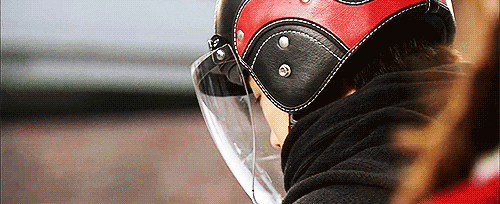
103. Unique
hairstyles on some characters so they stand out
from the crowd.
104. No
high school character can make it through high school
without being bullied.
105. Often near the
beginning of a drama the main couple cross each other on
the street or in a building and they don't know each
other yet, but the camera slows down as they pass each
other, or bump into each other, signifying that Fate
will eventually bring these two strangers together
romantically.
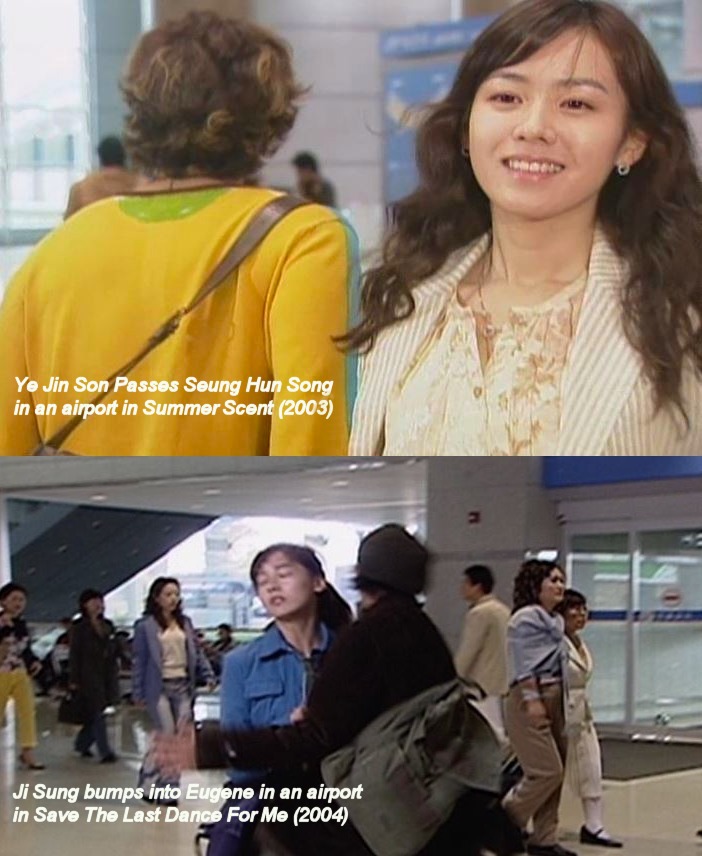
106. Falling
asleep while riding a bus then head resting on someone's
shoulder.
107. If
someone gets knocked out cold they always awake with
temporary memory loss. They gain it back eventually, but
usually only when they meet with another accident and
their head gets hit again.
108. The 360 degree
camera revolving kiss scene.
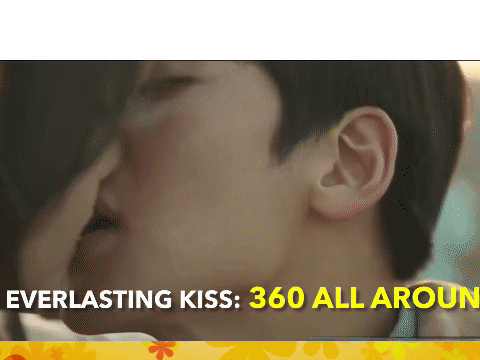
109. The frozen or static kiss
scene. Open your lips why don't you??? You're not
statues!
110. Best friends become enemies and then go
back to being best friends again.
111. The Time
Gap in the second to last or last episode. Often a whole
year will go by where our lovers are not together -
sometimes for more education, sometimes for illness
purposes, sometimes because one lover thinks the other
is dead but then they return. (To me this is
another common writing cliché that should go by the
wayside. The audience feels cheated out of a whole year
seeing our lovers grow as people. Then suddenly they are
back together and it often feels unnatural).
112. Flashbacks. Often
to childhood days. Lots and lots of flashbacks.
113. Music
themes that play over and over again in the background
of the dramas and fixate in your memory (and heart)
forever. Particularly memorable are musical interlude
scenes where there is no dialogue but you follow
characters doing something while music plays in the
background.
114. Scenes
that make you laugh one minute, and then the next minute
you are crying (and vice versa). Koreans definitely do
that on purpose to us. (So many times I don't have
a chance to wipe a tear away from one scene yet, but I'm
already laughing at the next scene).
115. Visiting burial graves that are built
over the ground, not underneath the soil.
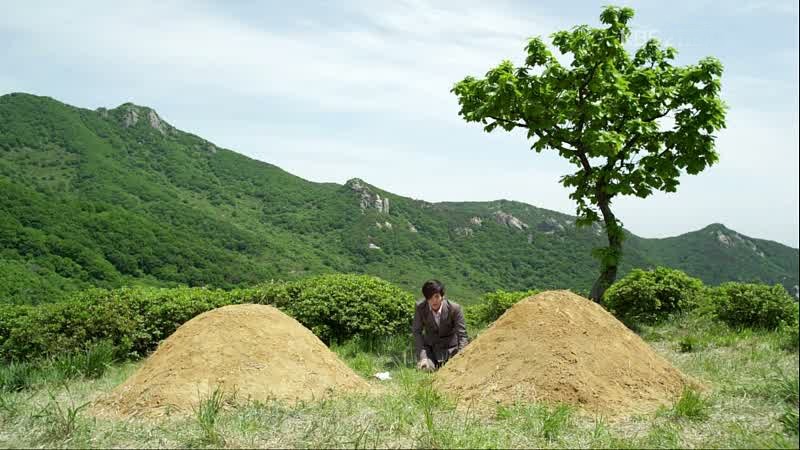
116. Bringing
liquor and food to the grave or to the person's death
memorial ceremony. (I always say that if I were
homeless in Korea I'd hang out in cemeteries to get a free
supply of food and drink).
117. Family secrets,
like birth secrets, being revealed midway or near the
end of the dramas.
118. Dramatic
Airport Scenes. Usually one person is chasing another or
they are rushing to say good bye to them for what they
think is the last time.
119. Unless a
dead body is recovered, the person is alive. Typical
examples, one jumping from a bridge, shot but fell to a
river (or creek, sea, etc).
120. Or, if nobody
has said someone has officially died, yet their ghost
comes to visit you, you know they are not officially
dead yet, they're rather in a coma, and you can stop
panicking.

121. Characters making heart signs
with their hands or arms or crossing their fingers
meaning I Love You ("Saranghae!").
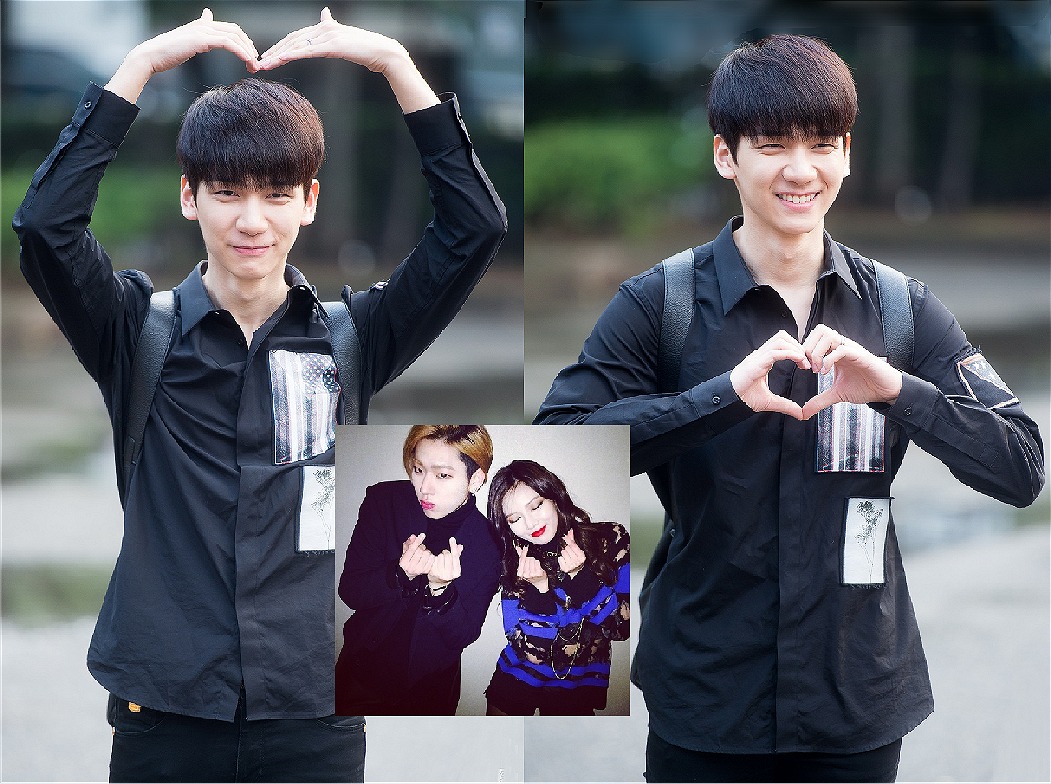
122.
Amusement Park Scenes, couples
often go on carousels or roller coasters.
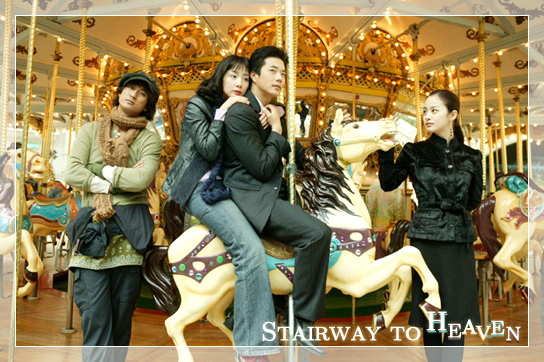
123. Mothers are sometimes abusive
to their children, hurl insults, will repeat old sayings
like "let's go die together" when they are annoyed.
124. Shaving scenes. The female lead shaves the
male lead after he's temporarily grown a mustache or
beard.
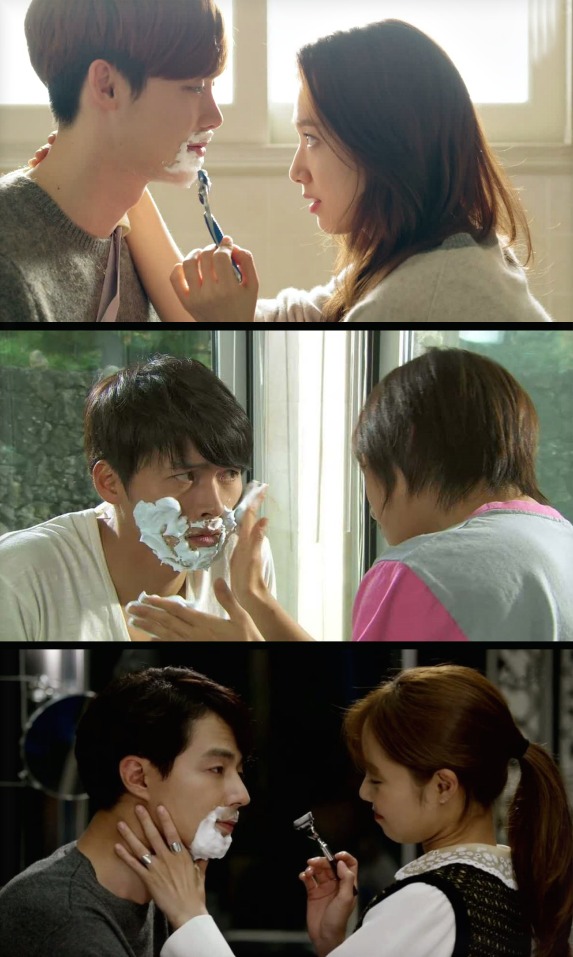
125. Forced Living Conditions. This
is in practically all romantic K-dramas. The writers
have to bring two people together who often don't even
like each other in the beginning, so they have to use an
exaggerated method of doing so: forcing the couple to
live together platonically, either because of debt, some
misunderstandings, an accident, saving face due to
career choices, awkward family situations where one of
the couple (usually the girl) feels embarrassed to live
with them anymore and due to some emergency situation
ends up living with some guy she barely knows.
126. Along with Forced Living Conditions are the
scenes in many K-dramas where the two main
characters are inadvertently locked in a room
overnight by accident, often a store room, a school
room, a barn, inside a restaurant, etc. If they didn't
get along before, this forces them to deal with each
other for the first time in a more intimate way.
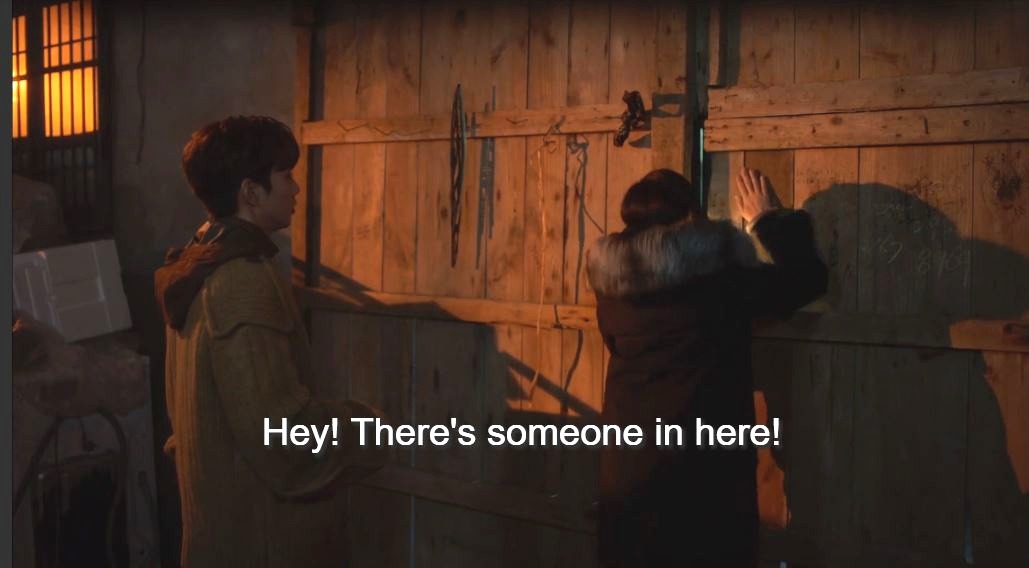
127. Group
singing the catchy tune, "Congratulations!" or the Happy
Birthday Song, "Sangachuckah hamnidah!"
128. Almost
everyone has a cell phone, but you rarely see people
charging them, which must be why their cell phones are
always dead or dying at a critical moment. Sometimes if
they want to silence their cell phone they actually take
the batteries out instead of just turning them off.
129. Of course,
there are the phones that are flung up into the air when
the heroine’s arm is knocked by a passing bicyclist or
motorcyclist ... which often leads to the hero’s
replacing the phone with the latest model.
130. Delayed
notification. Characters are forever declaring that they
need to tell someone something but saying they’ll do it
tomorrow or later, but then they get in an accident or
somebody else spills the beans before they have a
chance.
131. Characters
talking out loud to themselves instead of using
voice-overs to reveal their inner thoughts.
132. In every K-drama there is one place in
at least one scene where the year of the drama made can
be seen. Usually a calendar on the wall, or a date on a
sign somewhere. I've noticed this for over a decade.
It's like they fear the date of the show will be
forgotten or something. I think it's really cute
they do this, they don't do it in American shows. Watch
for it next time you watch a drama from the beginning to
the end. You will see it, guaranteed (except in a
non-fusion sageuk).
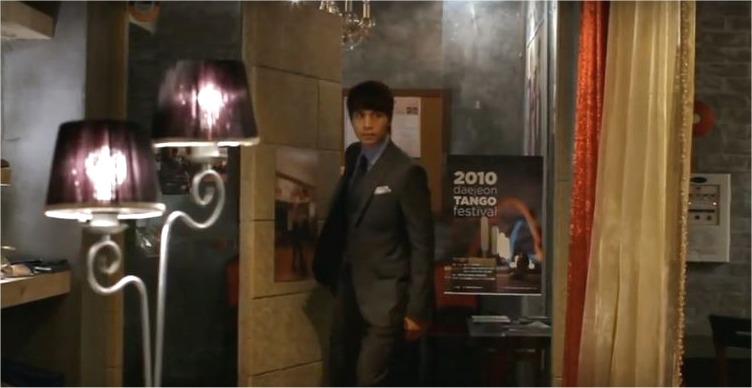
133. Occasionally high heel shoes
are meant to be broken or purposely removed and the lady
ends up walking barefooted or would lead to the
unfailing piggy back ride.
134. If a character
is hit by a car they ALWAYS bleed
from only their head. The camera will focus on the body either
dead, or clinging to life by a thread, laying face up on
the road and suddenly blood starts gushing from their
heads, never anywhere else on their body, just their
heads.
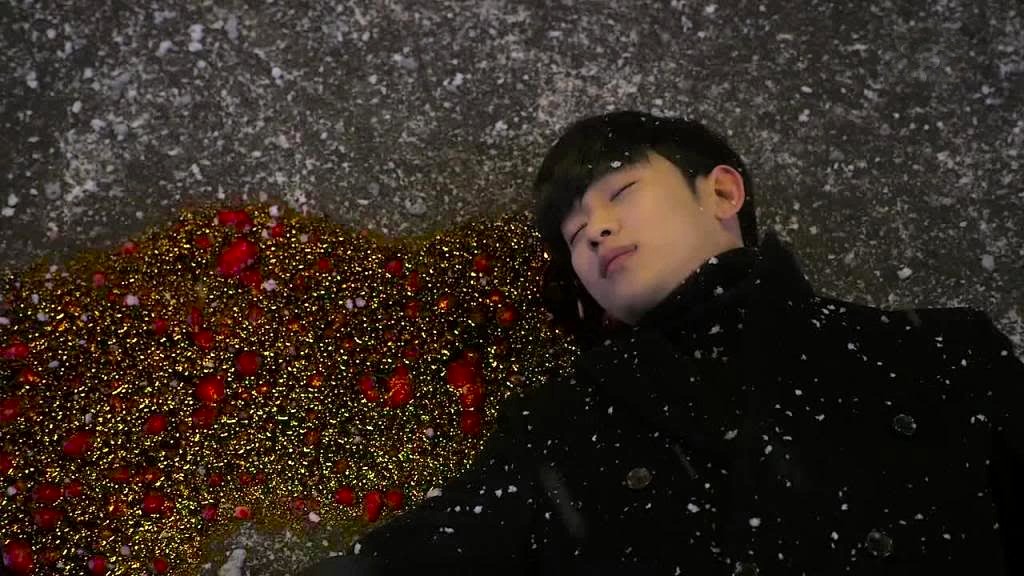
135. In every
romantic K-drama you can practically guarantee there
will be an Eavesdropping Scene where the rival lover
will hear the main couple chatting privately, or the
main lead lover will hear the female lead chatting
intimately with the second male lead.
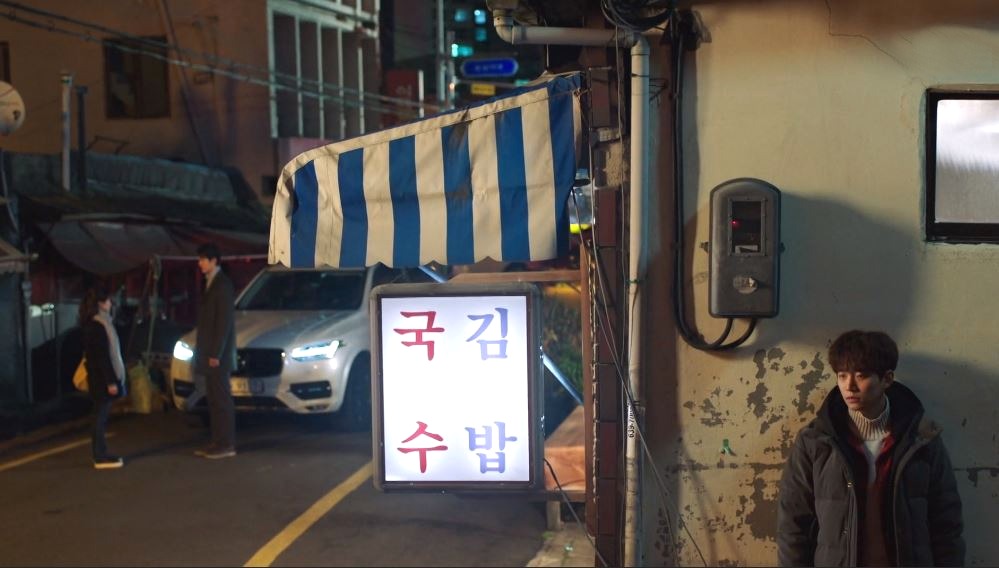
136. If two main characters are
destined to learn some big secret revelation about
themselves, then people they know who surround them on a
daily basis (friends, relatives) will accidentally meet
first, to pave the way for the big revelation to follow.
For example, the secondary characters will physically
bump into each other, important papers will drop on the
floor, both will exclaim "I'm sorry!" and pick up the
wrong papers, which will reveal some big secret to them
first, before the main couple discover what it is later.
137. Love confessions come about half-way
through a K-drama. If a drama is 16 episodes look for
the confession around episode 8. If it's 20 episodes
look for it around episode 10.
138. The
liberal use of wonderful older character actors playing
parents, bosses, or mentors. You tend to see the same
actors so often they begin to feel like family to you.
139. Someone
needs a bus/train ride but has no money? No worry, a
Good Samaritan will offer his/her ticket or will
volunteer to pay the fare.
140. If there are
jealous girls who are against the female lead character
or a secondary character they almost always come in
packs of threes.
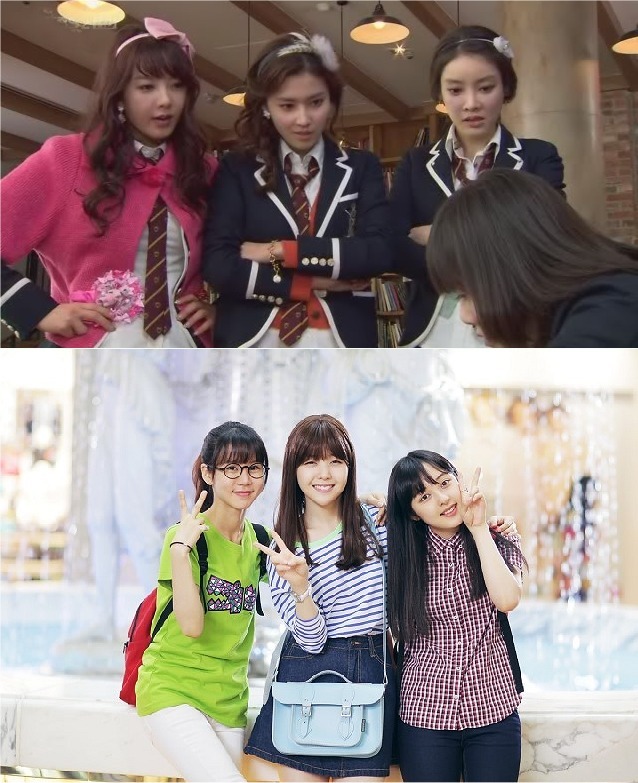
141. Facial
Mask Scenes so the characters can improve their skin.
Both men and women. Sometimes one character will take a
picture of themselves wearing one and send it as a
picture attachment on their cell phones to the loved
one. No brands are ever specified so this doesn't fall
under the category of Product Placement, rather simply
comedy.
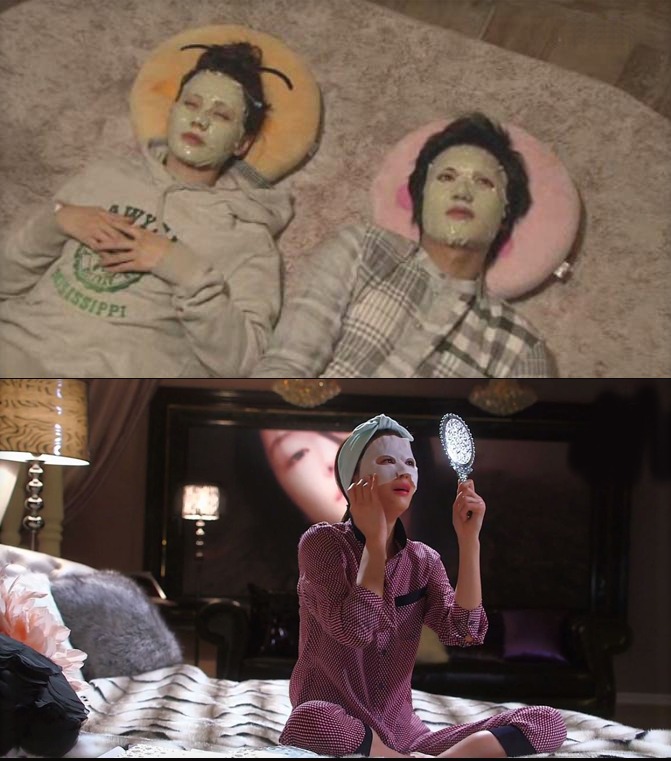
142. In
historical dramas there are always torture scenes. We
hate them but they are there, to remind us of the
brutality of those times, especially when the King
and/or Queen on the throne are mentally disturbed
individuals.
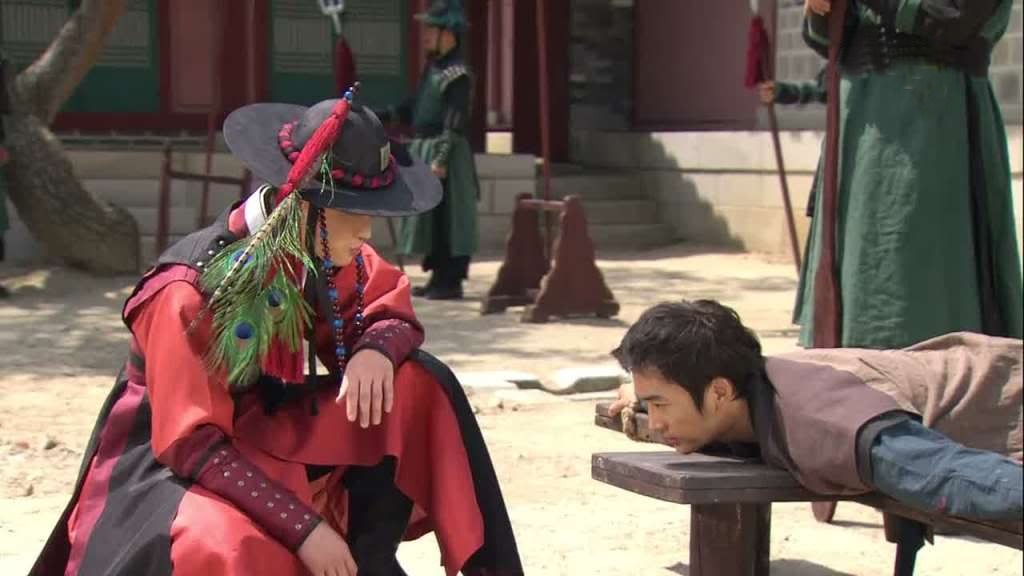
143. Sauna
Scenes, with the silly hats, often the characters are
seen eating a hard boiled egg and/or cracking the shell
over someone's head in these scenes.
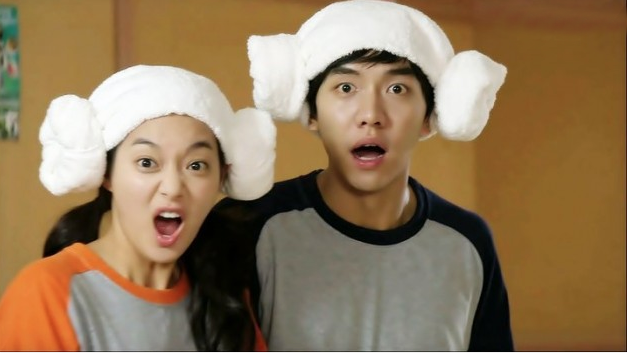
144. Finger
flicking the Forehead, and wrist thwacking, either as a
game itself or as a punishment for losing a game.
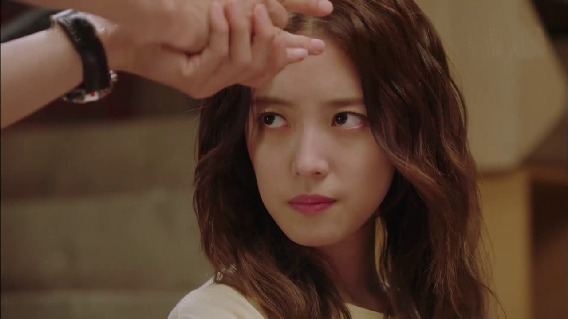
145.
The weird love that chaebols seem to have for plants -
especially orchids - obsessively cleaning and watering
them. Perhaps keeping their hands busy allows them time to
reflect on their next course of action! Of course, plants
are also convenient locations for hiding things, like
flash drives, wills, listening devices, or hidden cameras
or for burying evidence.
146. When a female character gets angry she will
yell "HYA!" The English translator will translate it as
"Hey!" but what we are hearing each time this happens is
a much funnier "HYA!"
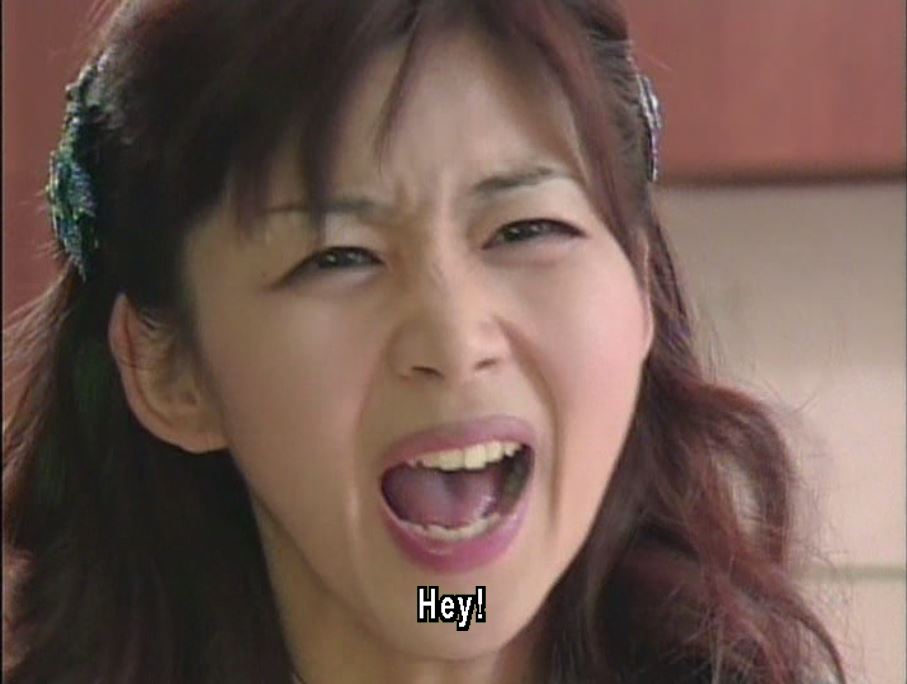
147. Loud exclamations: "AIGOO!"
"AISH!"
148. Clothing Weirdness. A) How can people in
Kdramas show up at a restaurant and not need to remove
their heavy winter coats? Aren’t they dying of heat? B)
How can people go to bed wearing the same clothes they
wore all day? C) How do people slip their shoes on and
off so quickly? Don’t the heels of their shoes get worn
down from the abuse they take? D) Who wears high heels
in an airport except a stewardess?
149. In a hospital
someone is always pulling out their own IVs without any
help from medical staff, many times it's just taped on,
so they just rip the tape off.
150. At some
time during practically every drama the first male lead
or the second male lead (and sometimes together) have to
take on a whole big group of bad guys, and they succeed
in knocking them all out every time! 1 against 10, no
problem! 2 against 20, a cinch!
151. Lead actress who
is in disguise as a man is usually unmasked/uncovered
first by the lead actor's best friend/rival (i.e.
Splendid Politics, Moonlight Drawn by Clouds, etc.)
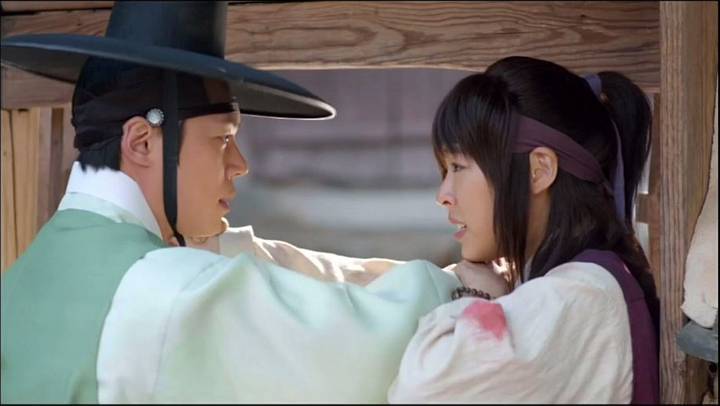
152. Sharing one
coat in the cold (often goes along with the back hug).
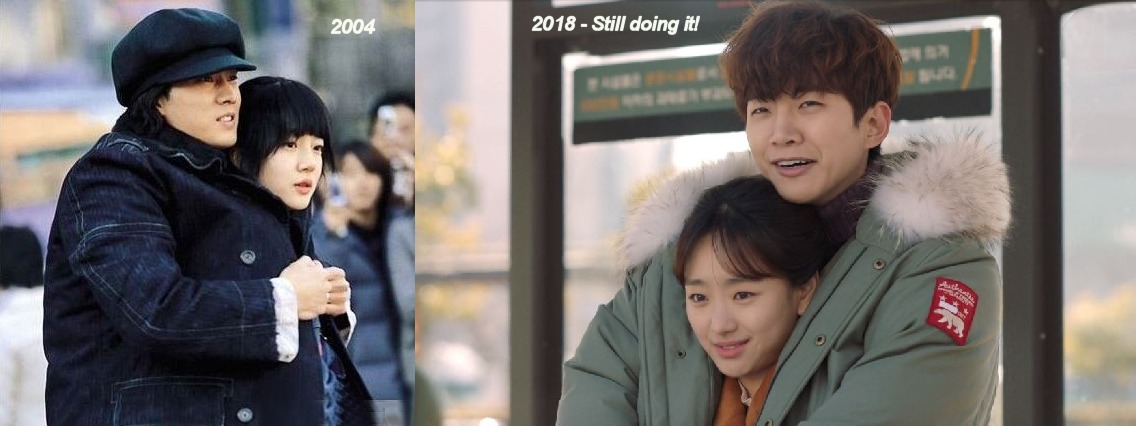
153. Loser
parents: i.e., one or more parents is a feckless
ne'er-do-well, has problems holding onto a job, is an
habitual gambler, has a problem with alcohol or
lends/loses money to a friend or business partner. This
can lead to 1) death, 2) the other parent abandoning
hearth and home, 3) constant visits by loan sharks, 4) one
of the children becoming the main support of the family,
usually at the cost of losing an opportunity to attend
university.
154. Occasionally
some dramas will show one-night stand story lines,
usually prompted by the over-consumption of soju, often
leading to pregnancy, with various scenarios playing
out: 1) forced marriage, 2) characters rediscover one
another after a break in time and their relationship is
rekindled, etc.
155. Characters
watching dramas or referring to dramas or characters
from folk tales or the use of music from well-known
dramas.
156. Obsession/possession with high power
telescope. Use for star gazing or spying. (i.e. Master's Sun, My Love From Another
Star)
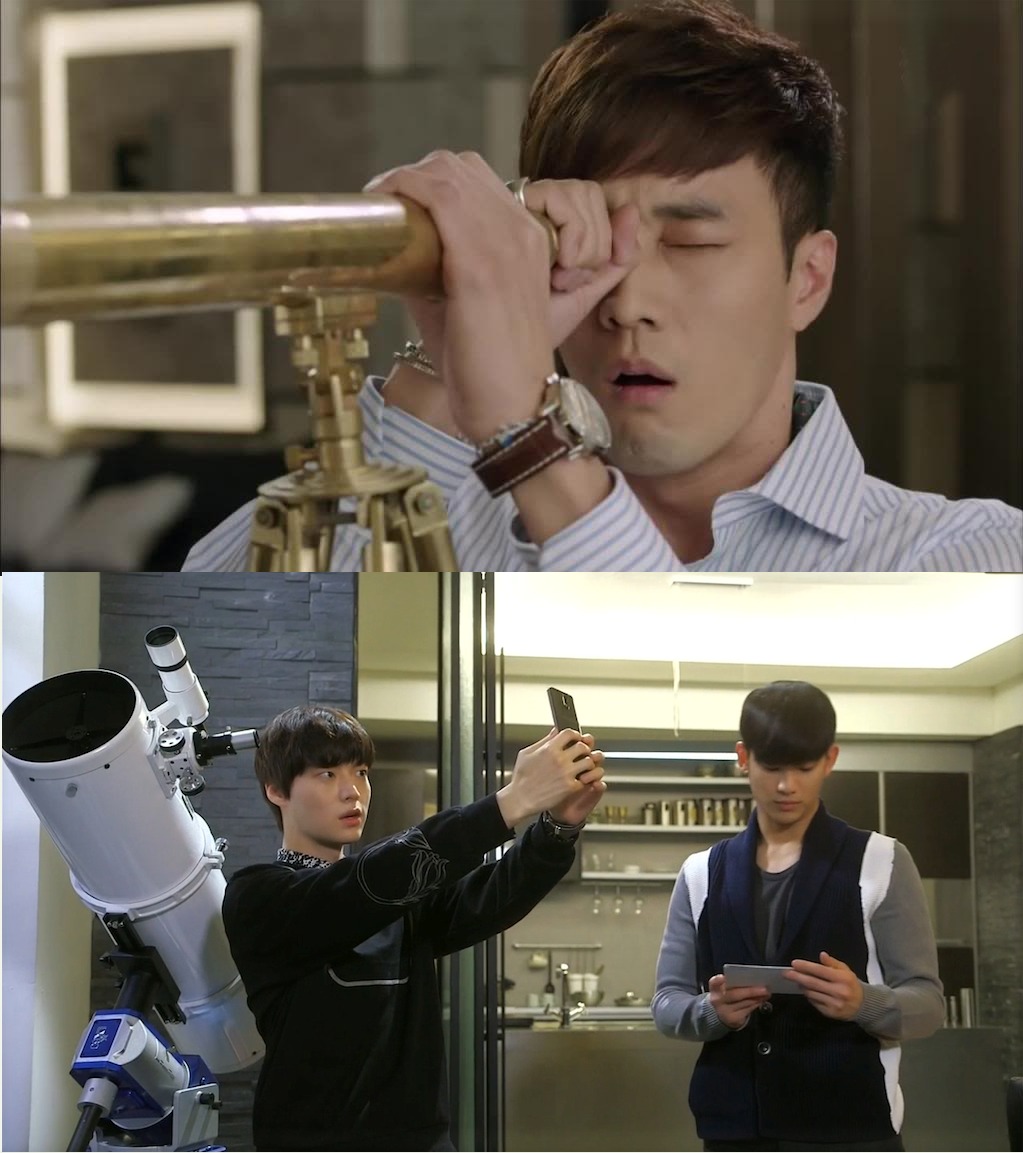
157. The
accidental reveal (partial or full) of enticing body
parts (though the actual parts are camouflaged by the
camera).
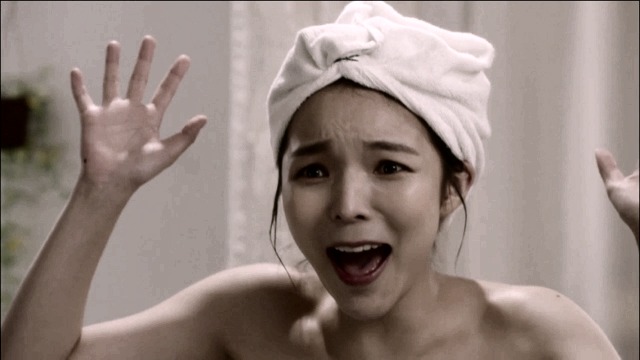
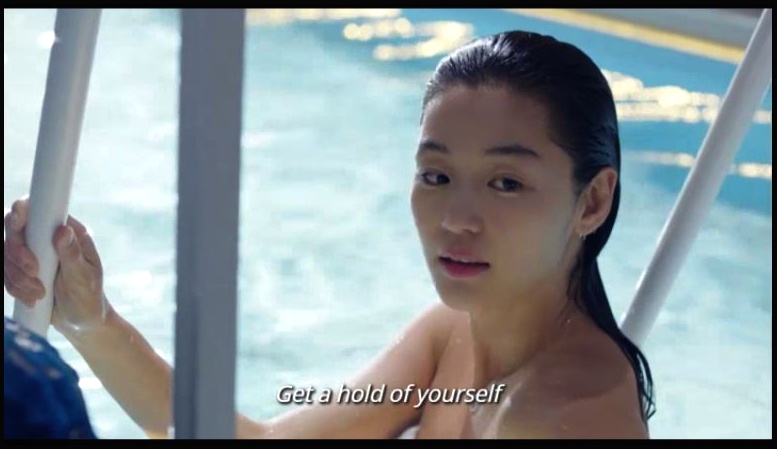
158. No one eats Western
style food unless it's Italian pasta or pizza, or
Subway. Rarely if ever does anyone in Korea bite into a
hamburger.
159. Whenever
Koreans order coffee it's always "I'll have an
Americano".
160. Nosy neighbors who spy
on what the main cast of characters are doing, a la
Gladys Kravitz in the old American TV show Bewitched.
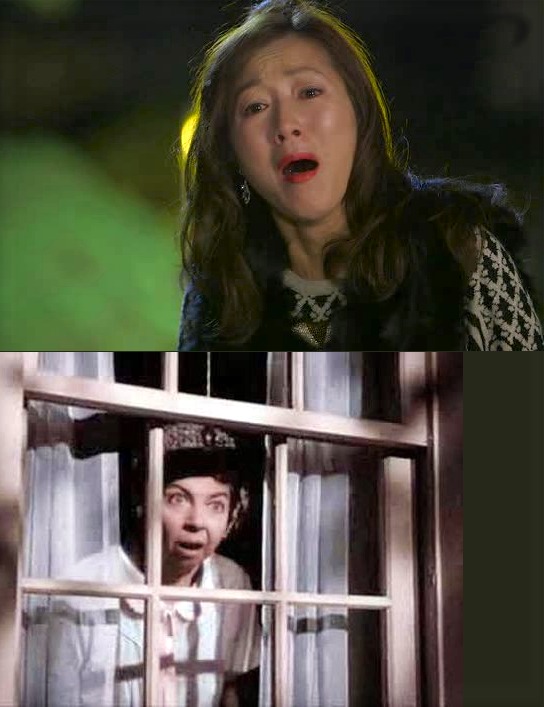
161. Korean remakes of famous
Japanese or Chinese dramas that end up being better and
more famous than their originals (i.e. Boys Over
Flowers, The Suspicious Housekeeper, Liar Game, Scarlet
Heart, etc).
162. Whenever characters
drink soju it is literally ALWAYS the brand in
the green bottle with black letters on white label. In
12 years of watching K-dramas I've never seen the
characters drink any other brand. It must contribute a
steady amount of advertising monies to make these
dramas.
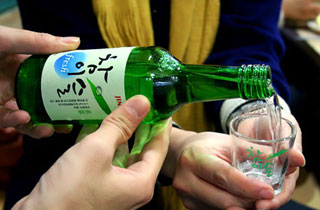
163. If one
character is really ticked off at another character
(especially if they've bested them in a conversation)
that character will throw a drink of water (or wine or
soju, whatever is handy) in the "offending" character's
face.
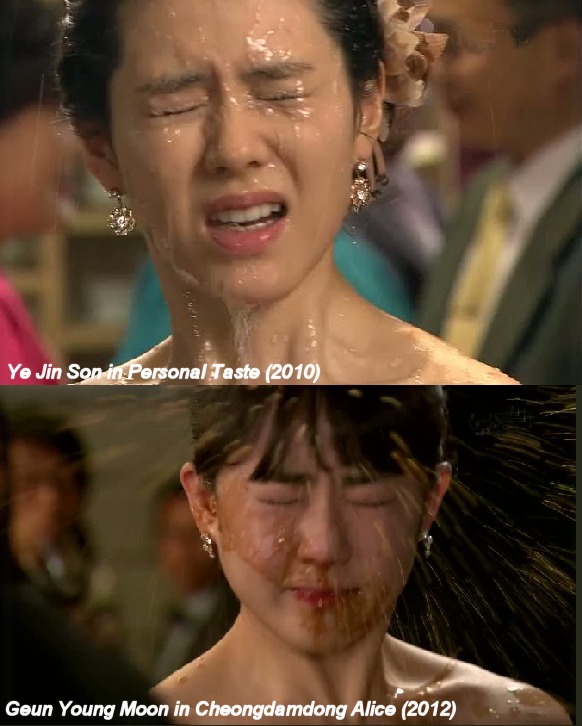
164. Common Laundry Scenes - often
characters will wash their clothes in a big basin filled
with water and soap and one or both characters will
enter the basin and stomp on the wet clothes like they
are pressing grapes for wine. Sometimes girl characters
will feel embarrassed when their male love interests see
their wet underwear hanging out to dry, and they quickly
try to get them out of sight.
165. When the main
couple, after fighting in the beginning of the drama,
start becoming friends there is almost always one trip
to the grocery store together. I've seen this in so many
K-dramas I've lost count, from I'm Sorry, I Love You to
Personal Taste to Angel Eyes to Goblin and on and on.
They often argue what they should buy for dinner.
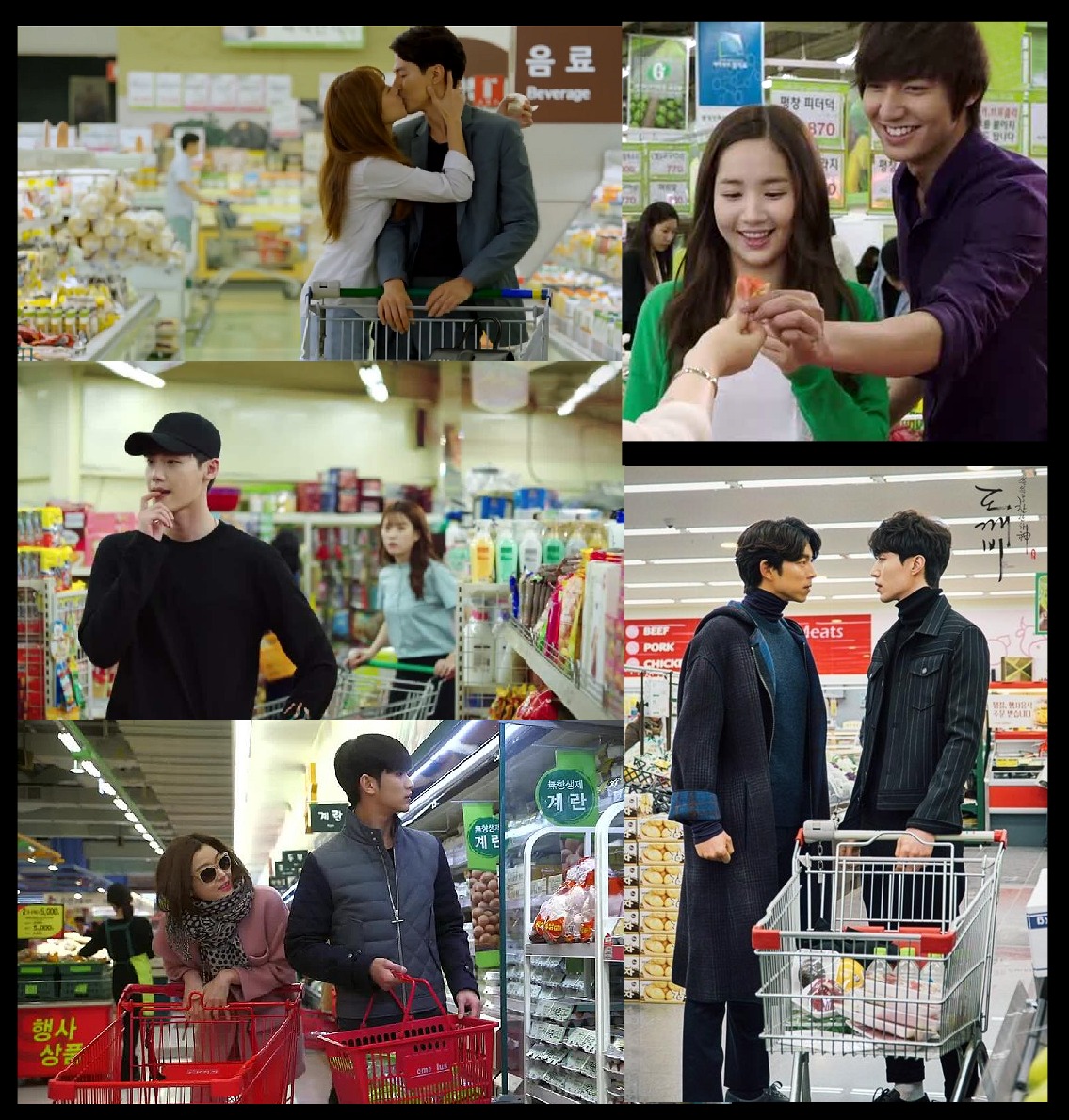
166. Getting wet for fun
(i.e. water fight, pushing/pulling someone to the pool,
splashing water along the shore line, etc.)
167. Wonderful
scenes and vistas from various places in Korea that
leave one yearning to see and experience them in person.

168. A chaebol's (mogul's) son /
daughter starts working in the company as a trainee
(rank and file). Their iidentity is kept secret to be
revealed later (i.e. My Love From Another Star, High
Society).
169. Fake Dating for an ulterior motive (i.e. Master's
Sun (to dispel rumors), Coffee Prince (to ruin blind
dates fixed by family) and Full House 2 (get rid of
scandals).
170. Trips to Jeju Island -
either romantic getaways, for business reasons, or just
for time out. Jeju is Korea's Hawaii.
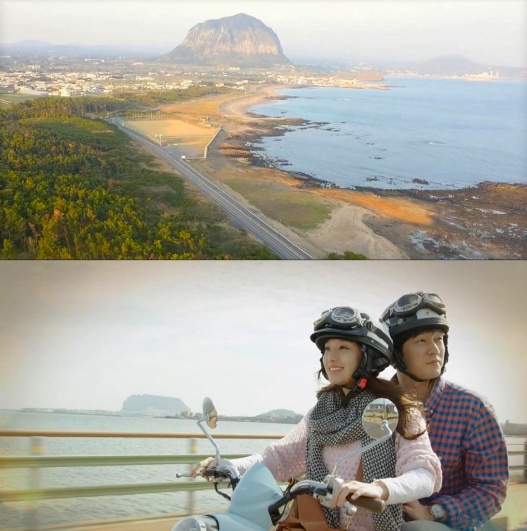
171. In high school based Korean
dramas we still see corporal punishment, boys get a
whacking and girls crouch down in a corner with their
hands in the air.
172. Identity concealment. Someone disguised by
wearing baseball cap whether being chased or intended to
commit a crime. The cap makes someone unrecognizable or
perhaps invisible.
173. Making A Wish / Saying
A Prayer. We often see characters making a wish, either
by coin throwing in a well, tossing a coin in a plate in
the pond, or before blowing out a candle. Depending on
someone's beliefs' orientation, a prayer can be done by
stone piling, kneeling inside the church, or bowing in
the temple.
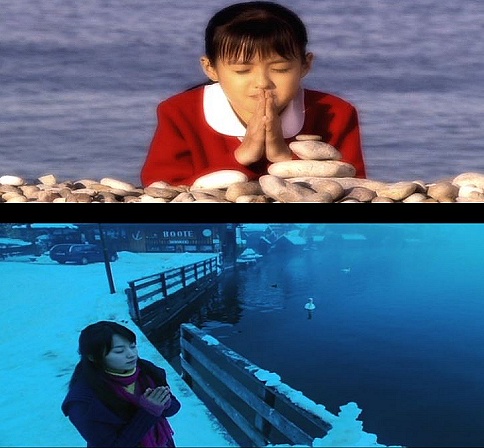
175. Hangover cures. Almost always
after a boozy night out you will see someone reaching
for or being served haejangguk (literally, “hangover
soup”) since most restaurants serve them round the
clock. Another alternative would be hangover drinks or
pills. Koreans even have hangover cure ice cream bars.
When Koreans party until the sun comes up (which is
fairly frequently), they will often crash at a
jjimjilbang aka a Korean spa.
176. Playing Rock, Paper, Scissor. "Kai Bai Bo!"
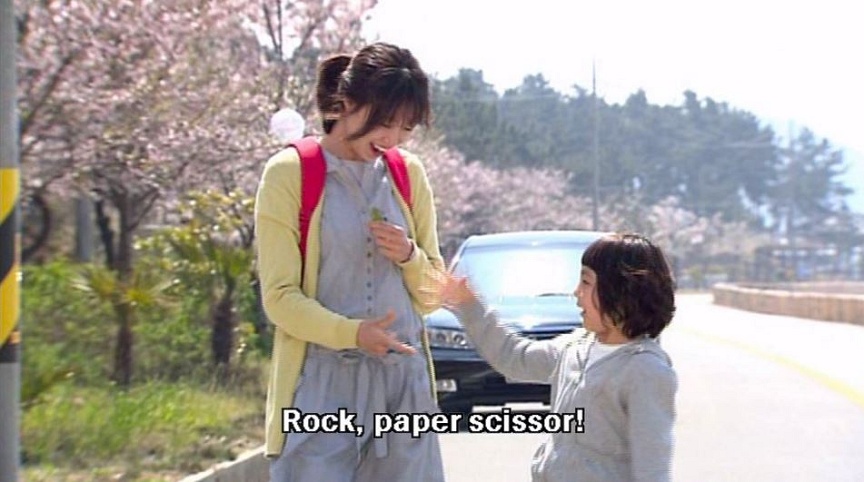
177. Abandoning someone on the
street. For a moment two people were having a
conversation, then got into a petty quarrel or
misunderstanding. Before you know it, someone was
leaving the other person on the street (anywhere, and it
didn't matter if it's a day or night).
178. When having a death ceremony, or
they want to say good bye to someone who died, they
throw chrysanthemums in rivers, lakes or seas.
179. Pinky swears.
Self-explanatory. Often combined with saying "Yaksok" =
"Promise". (It's the same word in Korean and Japanese).
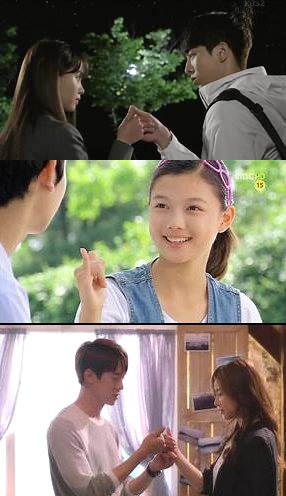
180. The biggest cliché of all: Cliffhangers.
At the end of every episode there has to be a dramatic
scene that keeps the audience coming back for more.
Usually the biggest cliffhanger in a 2 episode pair per
week comes at the end of the second episode of that
week, because the writers know that an audience needs
to come back after 7 days, so what better way than to
have a cliffhanger of an intimate nature so that it
looks like the main couple will kiss or become closer
physically / emotionally. It's all planned and it snares
them in every time. If it's a revenge / thriller /
political type of drama some big catastrophe will
happen, someone will get hurt and you're not sure if
they will die or not, someone will be chasing someone
else, leaving you wondering if they will catch the
person fleeing the scene, etc.
